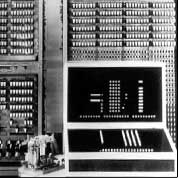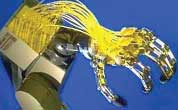 |
Left: Replica of the world's first computer,
by Schickard,
1623 (no programs yet).
Top: Leibniz,
inventor of the bit, 1701.
|
|
 |
|
Left:
Replica of the world's first program computer,
by Zuse,
1941
(museum).
Right: 70 Teraflops in the new
LRZ.
|
|
 |
Why join TUM?
Recent surveys of FOCUS and SPIEGEL
ranked TUM first among Germany's
universities, right ahead of Munich's LMU.
14 Nobel laureates
(the most recent one of 2005)
are associated with Munich, 4 of them with TUM.
In 2006, TUM and LMU were selected as two
of the three new German elite universities.
TUM CS has strong connections to
industry leaders such as Munich's
BMW
and
Siemens, and
boasts pioneers such as
Bauer,
who invented the stack and coined the term "software engineering."
Fibonacci web design
by J. Schmidhuber;
last update 2007
|
|
Why come to
Munich
(München)?
It is one of the world's most livable places
(ranked 2nd among the world's cities with over a million inhabitants, after Vienna, according to recent
surveys),
and gets consistently voted as Germany's most attractive city.
Lots of culture & fun, 100,000 students,
the world's largest festival
(Oktoberfest),
the world's oldest & largest
technical museum,
scenic Bavarian surroundings with lakes, rivers, hills, meadows,
bikepaths, castles, and beer gardens, close to major ski areas etc.
Many claim there is no
more beautiful region than the pre-alpine land between Munich and the Alps.
|
|
Why come to Germany?
It is a fine place for scientists and inventors, with
a long tradition of
fundamental breakthroughs
that define today's world,
including Western
bookprint,
the calculator,
binary arithmetics & calculus,
watches & other small machines,
math a la
Gauss,
the second industrial revolution based on the
combustion engine &
the car
& the first practical dynamo & electric locomotion, the
germ theory
of disease,
the modern research university,
general relativity,
quantum physics,
population explosion,
the transistor,
the computer,
controlled
heavy flight, the helicopter, the jetplane,
uranium fission, missiles,
X-rays,
robot cars,
and innumerable others.
For most of the 20th century (1901-1956) Germany boasted
more Nobel prizes than any other nation
(until 1965 if we consider
only the laureates' countries of birth; until 1975
if we consider only the sciences).
It is still the world's largest exporter.
|
|





























